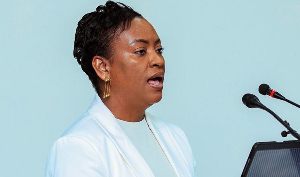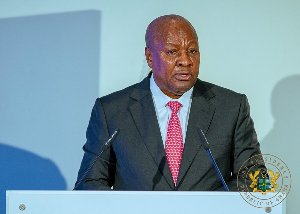One of the things I miss most, when I am not in Ghana, is the talk.
What?
Yes, the talk!
The talk of sagacious people; the talk of genuine achievers; the talk of those who are able to forget about their personal circumstances and think about what is happening in their country.
No nation can progress without such people, and to be able to discover them and exchange ideas with them creates – and I want to use the word that exactly defines what I want to say, so please pardon the big word – a serendipitous moment.
“Seren”-what?
Yes, you read it right. The meaning of the word is: pertaining to “the phenomenon of finding a valuable or agreeable thing not sought for”. In other words, a happy chance or accident; an unexpected attack of sheer ecstasy!
I experienced exactly such a feeling when I went to talk to Professor Robert Ado-Fening at his home in an Accra suburb recently. I had gone to see him primarily to hear what he had to say about the late Prof Albert Adu Boahen, who taught Ado-Fening history at the University of Ghana, Legon.
But in the course of talking to him, I discovered that Ado-Fening was every bit as good a story-teller as Adu Boahen and that the work ethic with which he approaches historical research, owes much to what he learnt while “sitting at the feet” of Adu Boahen for many years.
Ado-Fening was born at Osino in Akyem Abuakwa (a town made famous by a peculiarly delicious type of kenkey wrapped neatly in the wide green leaves of a plant with very soft green leaves,, that was sold to passengers whose vehicles passed through Osino on the Accra-Kumase road. Someone very clever christened this kenkey “Osino Graphic” and the name stuck. “Osino Graphic?”
Yes – the kenkey became popular at a time – alas, now no more – when few literate persons could pass the day without having read the Daily Graphic. The paper was so efficiently distributed that as soon as a lorry stopped in a town or village, a young boy would come towards it brandishing copies for sale to the passengers. So, a witty Ghanaian, observing the similarity that lay between the modus operandi of the Graphic sellers and that of the women who sold kenkey to travellers at Osino, gave the name of the one to the other. Neat and simple.
As far as I know, the Daily Graphic hasn’t ever bothered to do a story about Osino Graphic, a failure for which I share the blame, having once occupied the editorial chair of that publication myself! Osino is also known by the name Mumuadu, but I don’t have the space here to go into that.
Ado-Fening was born long before Osino got its reflected glory from newspaper readers – on 7 March 1935. His mother was called Adwoa Adowaa, but was given the nickname “Asam” (presumably because she was seen as being as good-looking as a bird of exquisite plumage found in the area, and whose name was asam.)
His father was called Opanin Kwame Fening and hailed from Asafo-Akyem. Ado’s mother had nine children – three of whom were sired by Ado’s father. Of the nine, seven survived – a remarkable feat since infant mortality was high in those days.
In January 1941, Ado was enrolled at the Salvation Army Mission School at Osino, at the age of six. It is amazing how village schools of that type managed to be the starting point of the educational career of so many Ghanaian men of letters: Adu Boahen, for instance, began by having to walk seven miles per day to go to school, while Ado-Fening began in a school which, in his own words, was: “housed in a thatched building [in which] a couple of long benches provided the only seating, apart from the teacher’s chair and table.”
Who could have foreseen that such humble beginnings would have an eminent Professor of History at the University of Ghana as its end-product?
From the humble Salvation Army Mission School, Ado-Fening reached the University of Ghana by way of the Osino Presbyterian School, Asafo Akyem Presbyterian, and Accra Academy (by grace of an Akyem Abuakwa State scholarship.) He passed the Cambridge Overseas School Leaving Certificate examination in December 1953 and then, obtained admission to the Post-Secondary Teacher Training Course at the [then] Kumase College of Technology. On qualifying, he was posted to the Methodist Mission Senior School at Atibie near Mpraeso, Kwahu.
Now, I want my readers to pay particular attention to the quotation I am about to produce from Prof Ado-Fening’s very informative autobiography (scheduled to be published soon), for it epitomises the thirst for education that inspired many of us who were brought up in the colonial period and were denied educational opportunities but refused to accept the situation and managed, by our own means i.e. private study – to acquire the qualifications needed to advance in education:
QUOTE: “In my second year [of teaching] at Atibie, I drew inspiration from the example of a course-mate at the College of Technology, who [had] passed the Inter-BA examination through private study. I enrolled with Wolsey Hall [Oxford, England] for a correspondence course of study towards the General Certificate of Education (Advanced Level)…I took the “A” level examination in late1957….[and] passed. [This gained] me exemption from Matriculation of the University of London and …made me eligible for admission to the University of Ghana.” UNQUOTE
Ado-Fening entered the University of Ghana in October 1959. He read History and among his course-mates was an old friend of mine the late Kofi Aning-Asamoah of Asiakwa. Significantly, Ado-Fening’s lecturers included the late Professor Albert Kwadwo Adu Boahen, who, having just returned from his doctoral studies at the School of Oriental and African Studies in London, was to revolutionise the teaching of African history at Legon, and indeed – through his books and lectures abroad – in the whole wide world, as well.
TO BE CONTINUED
Opinions of Saturday, 5 August 2017
Columnist: Cameron Duodu















